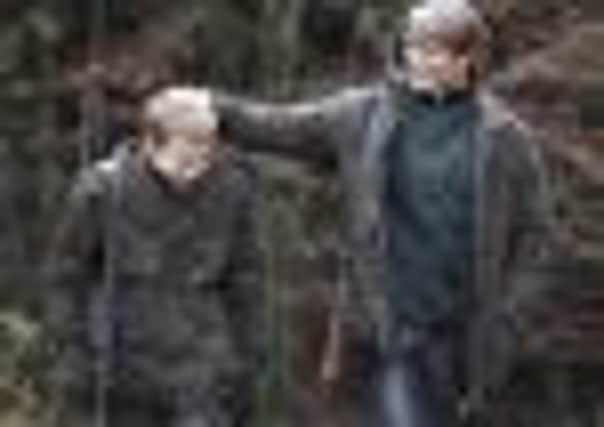Film review: The Hunt (15)


The Hunt (15)
Directed by: THOMAS VINTERBERG
Starring: MADS MIKKELSEN, THOMAS BO LARSEN, ANNIKA WEDDERKOPP, LASSE FOGELSTRØM
Star rating: * * * *
DANISH director Thomas Vinterberg delivers his most vital and effective film for nearly 15 years with The Hunt, a provocative and queasily compulsive Christmas-set drama revolving around a man falsely accused of child molestation in a small rural community.
Advertisement
Hide AdAn inversion of his The Celebration, which initiated the Dogme-95 movement (and explored the fallout of sexual abuse allegations levelled against a father by his grown-up children), the film finds Mads Mikkelsen on damaged and defiant form as a nursery school teacher bewildered, then horrified, to find himself accused of inappropriate behaviour by the adorable four-year-old daughter of his best friend.
That he hasn’t done anything is never left in any doubt. There’s no smoking gun, no ambiguity and Mikkelsen’s character Lucas isn’t presented as being in the least bit shifty or shady. The kindness and affection he shows towards four-year-old Klara (Annika Wedderkopp) – who lives nearby and is a member of his class – is the sort of kindness and affection any reasonable person would expect someone to show towards their best friend’s children.
That Vinterberg isn’t going to mess around in this respect is evident early on. Klara’s accusation, made to Lucas’s boss, has its roots in a momentary prank in which her older brother and his friends thoughtlessly let her see a pornographic image they’re messing around with on their iPad. Beyond this, however, the film smartly offers no fact-based reason for why she’s conflated her exposure to this image with her interactions with Lucas.
Instead, her guileless confusion becomes the device the film uses to test both Lucas’s dignified resolve in the face of potentially ruinous rumours and the loyalties and rationality of a supposedly civilized society that appears unwilling to accept the truth of any scenario unless it’s the most heinous one.
The latter is bluntly but effectively foreshadowed by both the title (which clues us into The Hunt’s status as a modern witchhunt-style horror movie) and Vinterberg’s decision to open the film with Lucas and his friends – among them Klara’s father Theo (Thomas Bo Larsen) – participating in a hunting expedition during which we see the attendant rituals that emerge when a group of men who have grown up together attempt to keep long-running tradition alive. Swimming naked in the wilds and getting roaring drunk together, their atavistic natures are given free rein away from their wives, children and civilisation in general. After the accusations emerge, however, Vinterberg shows how quickly and irrationally these same long-suppressed impulses can surface in any members of polite society – and just how brutal and ugly they look when they do. There’s a remarkable sequence, for instance, when Lucas attempts to buy some Christmas groceries from the local supermarket deli. Denied service by the butcher, the manager and the shelf-stacker, his subsequent refusal to retreat meekly into the street is met with shocking violence, countered only by Lucas’s decision to fight fire with fire by head-butting one of his attackers, retrieving his shopping and paying for it while blood pours from a gash on his head. It’s a sad and disturbing scene, made worse by the fact that many of those who know Lucas best unquestioningly take Klara’s word over his on the simple basis that she apparently never lies – despite the fact that others remark on the vividness of her imagination.
What the film does spectacularly well, though, is show how quickly and completely such allegations can tarnish anything connected to them – from the accused to the accuser to the accuser’s family. Lucas’s decision to become a nursery auxiliary, for example, is suddenly viewed with suspicion rather than as the only employment option that was open to him after local school closures cost him his job as a secondary school teacher. His somewhat lonely existence in a house on the edge of the woods is similarly pored over instead of being accepted as the lifestyle of a recent divorcé still reeling from no longer being able to see his teenage son as much as he’d like.
Advertisement
Hide AdWhat’s more, when his son does come to visit, he’s physically attacked for defending his dad – an irony the adults in the town so intent on protecting minors can’t even begin to process. Indeed Vinterberg is careful to show the deleterious effect such ostracism has had on the town as a whole by building to an astonishing Christmas church service where the congregation collectively reveals just how much they’ve been twisted and corrupted by their own willingness to believe the worst in people.
It’s a remarkable, powerful and provocative piece of filmmaking and the fact that it’s being released in the UK at time when temperatures are already running high about this issue just gives the ideas within it added traction. The Hunt mercifully doesn’t hector or moralise though; it soberly encourages us to hold on to our humanity.